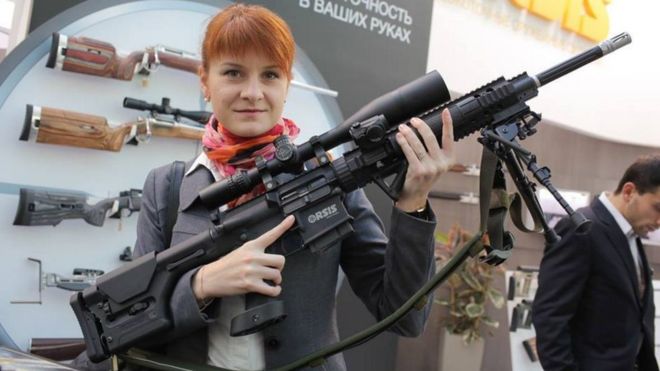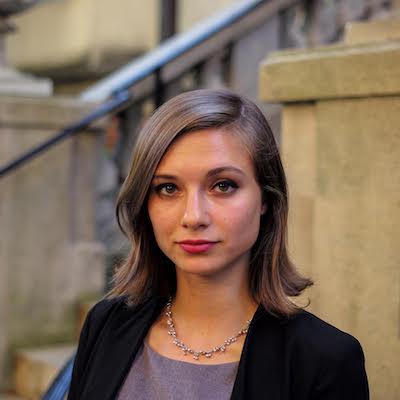The Latest Russia Twist: Criminal Charges Against Mariia Butina
The Justice Department’s National Security Division, not the special counsel, unveils a potentially new front in Russian election interference.

Published by The Lawfare Institute
in Cooperation With

President Trump had barely finished with what Sen. John McCain called “one of the most disgraceful performances by an American president in memory”—his joint press conference with Vladimir Putin in Helsinki—when the Justice Department fired its latest broadside against his inexplicable skepticism about Russian interference in American politics.
Trump, standing next to the Russian dictator, had credulously lapped up Putin’s denial that Russian state actors had hacked the Democrats (“President Putin was extremely strong and powerful in his denial today”); he had blamed the United States, along with the Kremlin, for the chill in U.S.-Russia relations (“I think that the United States has been foolish”); and he had floated widely debunked conspiracy theories as an alternative explanation for the Democratic National Committee hack (“Where are those servers? They’re missing; where are they? What happened to Hillary Clinton’s emails?”). He did all this despite Special Counsel Robert Mueller’s indictment Friday of 12 Russian military officers for the 2016 hackings.
Yet as if to bracket the president’s meeting with the Russian dictator with maximal humiliation, the Justice Department—part of the supposedly unitary executive branch under Donald J. Trump—announced Monday that a “criminal complaint was unsealed today in the District of Columbia charging a Russian national with conspiracy to act as an agent of the Russian Federation within the United States without prior notification to the Attorney General.”
The department’s new action deals with the activities of one Mariia Butina, a Russian woman who allegedly worked to create “back channel[s]” of communication between U.S. politicians and the Russian government. The affidavit in support of the criminal complaint against Butina—filed by FBI Special Agent Kevin Helson—contends that Butina worked alongside a “Russian Official” (identified in the media as Aleksandr Torshin) and with the help of “U.S. Person 1,” focusing on developing relationships within a “Gun Rights Organization” (clearly the NRA). According to the affidavit, Butina also worked to engineer meetings between Russian officials and Americans, including an influential “U.S. Person 2.” These two people remain publicly unidentified.
Trump is not the only one that the criminal complaint should humiliate. Only a few months ago Rep. Adam Schiff—the ranking Democrat on the House intelligence committee—complained publicly that the committee majority was releasing its report without even interviewing the individuals involved in this bizarre episode. The majority report “ignores significant outstanding questions about individuals who sought to set up this backchannel,” wrote Schiff and the Democratic members of the committee, “including why Torshin and Butina were interested in connecting the Trump campaign to Putin, what they sought to get out of that connection, why they enlisted the support of NRA colleagues, and whether others in the campaign were communicating with Russia through the NRA.” The Justice Department action Monday—even as the president was busy, in McCain’s words, “abas[ing] himself … before a tyrant”—rather vindicates Schiff’s curiosity.
Before turning to the details of the allegations, a few antecedent points:
First, this was not an action by Mueller but by the Justice Department’s National Security Division (NSD) and the U.S. attorney’s office in Washington. Precisely why that is so is not entirely clear from the documents. The activity described in the criminal complaint and the accompanying affidavit certainly covers the period of the 2016 election campaign. It certainly includes allegations of Russian “meddling” or “interference” in the U.S. political system. Mueller would almost certainly have been within his rights had he considered this matter within his jurisdiction under a grant of authority that includes “any links and/or coordination between the Russian government and individuals associated with the campaign of President Donald Trump” and “any matters that arose or may arise directly from the investigation.” Whether Mueller passed the matter off to the NSD, or whether it originated there, the fact that this investigation is being handled outside of the special counsel’s office shows the discipline Mueller is exercising in not taking on matters that aren’t strictly related to Russian interference in the 2016 election. He passed the Michael Cohen investigation off to the U.S. Attorney’s Office for the Southern District of New York. And this one—though more obviously linked to the matter of Russian electoral interference—ended up, by one means or another, not in his shop but in the NSD and with the U.S. attorney for the District of Columbia.
These decisions reflect discipline and modesty on Mueller’s part; he is not building an investigative empire the way Kenneth Starr did, to Starr’s own great cost. And they have a very happy collateral effect: They significantly reduce the potential consequences of a Mueller firing. If Trump were to fire Rod Rosenstein or Mueller or both in a fit of pique tomorrow, the Michael Cohen investigation would continue. This prosecution would continue. The Russian hacking indictment has been passed to the NSD.
There is no investigative Fort Knox here that the president can easily disrupt. He cannot fire his way to impunity any longer—if he ever could.
Second, it is significant that the Justice Department did not proceed in this case by indictment but, instead, by criminal complaint and by arresting Butina, who appeared in court Monday afternoon and will remain in custody pending a hearing Wednesday. Generally speaking, the department proceeds in this fashion when it has some reason to fear flight or for some other reason lacks confidence that a putative defendant will surrender upon indictment.
The fact that Butina is in custody, moreover, makes this case very different from either the Internet Research Agency indictment in February or the hacking indictment last week. In those instances, the defendants are outside the jurisdiction of the United States. Their cooperation cannot be won or coerced under any situation a prosecutor can count on or engineer—though Putin did mockingly suggest during the press conference Monday that the Russian government could interview the GRU officials under its mutual legal assistance treaty with the United States, a suggestion Trump characterized as an “incredible offer.” In this case, however, with Butina inside the U.S. criminal justice system, it is possible to imagine, say, asking her with whom she may have “colluded” in the U.S. And it’s possible to imagine her having significant incentives to answer to such questions truthfully.
Third, while it is impossible to know at this stage how big a deal this case is, at a minimum it is another example of the breadth of Russian efforts to influence the U.S. political system. Consider: In February, the Justice Department alleged a covert social media influence scheme designed to “interfere with [U.S.] elections and political processes.” Last week, it alleged that Russian state actors had “conducted large-scale cyber operations to interfere with the 2016 U.S. presidential election.” Monday, it alleged a conspiracy to “infiltrate organizations active in U.S. politics in an effort to advance the interests of the Russian Federation.” Read the two indictments and criminal complaint in conjunction with one another, and the scope and scale of what the president—in the presence of Putin himself—refuses to accept snaps into view.
So what has the government alleged? That Mariia Butina engaged in a conspiracy with a Russian government official in order to soften U.S. policy toward Russia on behalf of Moscow without properly notifying the Department of Justice. She did this, the government alleges, by using relationships with officials in influential conservative political groups, including the National Rifle Association, to establish private lines of communication on behalf of representatives of the Russian government.
The Russian official in question is allegedly a “high-level official in the Russian government” who was “previously a member of the legislature” and a “top official at the Russian Central Bank”—a description that matches the biography of Alexander Torshin, who was a senator in the upper house of the Russian parliament for more than 10 years and later served as a deputy governor of the Russian Central Bank. Multiple news stories over the past few months have reported on his and Butina’s support of the NRA. Indeed, both Butina and Torshin are lifetime members of the NRA: In 2016, Torshin tweeted that he and Butina were the only Russians who could claim that distinction. According to the affidavit in support of the criminal complaint, Torshin “directed” Butina in her activities in the United States.
The affidavit describes the activities of Butina and Torshin in terms of the Russian leadership’s broader strategic objectives: to “expand [Russia’s] sphere of influence and strength,” particularly by “[p]enetrating the U.S. national decision-making apparatus and Intelligence Community.” The government lists two categories of means through which the Russians aim to achieve these ends. First, Butina and Torshin aimed to establish back channels, or private lines of communication, between representatives of the Russian government and Republican Party leadership. The document suggests that such “lines could be used by the Russian Federation to penetrate the U.S. national decision-making apparatus to advance the agenda of the Russian Federation.”
Second, Butina and Torshin allegedly aimed to establish relationships with American political organizations, including the “GUN RIGHTS ORGANIZATION,” which is clearly the NRA. The affidavit alleges that they “took these steps in order to infiltrate those groups and advance the interests of the Russian Federation.”
The affidavit describes tactics within the Russian operation that included:
- Assignments from Torshin to Butina;
- Meetings between Butina and American politicians and political candidates;
- “BUTINA’s attendance at events sponsored by special interest groups, also attended by U.S. politicians and political candidates”; and
- “BUTINA’s reporting back to Moscow through the RUSSIAN OFFICIAL the results of the various encounters with the U.S. politicians and political candidates.”
Components of Butina and Torshin’s tradecraft appear throughout the affidavit—not all of them clever. They communicate by Twitter direct message and email. The FBI agent says he reviewed PDFs that Butina had on her laptop of direct-message conversations between her and Torshin.
Between the two of them, the affidavit alleges, Butina and Torshin worked to put Butina in touch with influential NRA members. The government writes that Butina sought to arrange “a series of ‘friendship and dialogue’” dinners bringing together U.S. political figures with Russians in Washington, D.C., and New York City.
She also attended both the 2016 and 2017 National Prayer Breakfasts and at one point floated bringing Putin himself to the 2017 breakfast. (Torshin also attended the breakfast; he and Butina were scheduled to meet Trump after the event, but the White House canceled the meeting at the last minute after a national security aide raised concerns.)
Like the indictment released Friday, Monday’s action raises a big question: What role did Americans play, if any, in this alleged conspiracy? Americans are mentioned throughout the affidavit, and they appear to have played a big role in helping Butina with her work. But there is a difference between interacting with conspirators and co-conspiring.
The first American the affidavit mentions, “U.S. Person 1,” is described as an American citizen and political operative whom Butina met around 2013. While this person has not yet been firmly identified, the New York Times reported in December 2017 that Butina had become close with Paul Erickson, an NRA member and activist who pushed for a meeting between Trump and Putin before the 2016 election. According to the affidavit, U.S. Person 1 advised Butina in her effort to develop relationships with key political and business leaders and to influence their views on Russia.
The document refers to a second American, or “U.S. Person 2”; this person is described as a U.S. citizen who was involved in communications about the “friendship and dialogue” dinners, which Butina allegedly began to organize as early as March of 2016.
The timeline of Butina’s work, as described in the affidavit, runs from March 2013 to February 2017. In March 2015, Butina allegedly reached out to U.S. Person 1 about a “project proposal,” seeking that person’s feedback. According to the affidavit, Butina wrote in her proposal that a major U.S. political party—clearly, in context, the Republican Party—would likely win control of the U.S. government after the 2016 elections. Her email goes on to say that the party is “traditionally associated with negative and aggressive foreign policy, particularly in regards to Russia. However, now with the right to negotiate seems best to build konstrukivnyh [sic] relations.” Consider Butina’s language as quoted—and redacted—in the affidavit: the “[c]entral place and influence in the [POLITICAL PARTY 1] plays the [GUN RIGHTS ORGANIZATION]. The [GUN RIGHTS ORGANIZATION] [is] the largest sponsor of the elections to the US congress, as well as a sponsor of The CPAC conference and other events.” According to the affidavit, Butina also described her desire for money to participate in all major upcoming GOP conferences. The government alleges that the same email detailed Butina’s relationships with NRA leadership, Butina and Torshin’s connections with other NRA officials, and instances in which Butina had been introduced to GOP leaders.
U.S. Person 1 responded later that month with a recommended list of “potential media, business, and political contacts” who would be interested in Butina’s project, saying most of those contacts could be reached through her existing political network. On Oct. 4, 2016, U.S. Person 1 allegedly emailed an acquaintance: “Unrelated to specific presidential campaigns, I’ve been involved in securing a VERY private line of communications between the Kremlin and key POLITICAL PARTY 1 leaders through, of all conduits, the [GUN RIGHTS ORGANIZATION]” (redactions in affidavit).
The affidavit describes Butina’s efforts to enlist U.S. Person 2 as a partner in building the back channel, which appear to have included a fair amount of flattery. In March 2016, Butina wrote by email that Torshin was “very much impressed” by U.S. Person 2 and appreciated his or her efforts to “restore relations between” the U.S. and Russia. Later that month, Butina confirmed to U.S. Person 2 that a representative of Russian President Vladimir Putin approved of their “Russian-American project” to build a “communication channel.”
During and after the 2016 election campaign, both U.S. Person 1 and U.S. Person 2 participated in Butina’s efforts to coordinate the Russian presence at the 2017 National Prayer Breakfast. In the final email documented in the affidavit, Butina seemingly confirms her connection to the Russian government to U.S. Person 2: “Our delegation could not stop chatting about your wonderful dinner. My dearest President has received ‘the message’ about your group initiatives and your constructive and kind attention to the Russians.”
The affidavit spins a fascinating yarn, but it’s not yet clear whether it is a significant component of L’Affaire Russe. Is this operation in any meaningful way connected to the hacking operation, to the social media operation, or to apparent efforts to reach out to individuals associated with the Trump campaign and organization during the period of the campaign? That remains opaque. As we suggested above, it is too early to determine whether this action represents another major front opening up in the criminal investigative problems facing President Trump with respect to Russian electoral interference or whether it is a sideshow affecting a discrete group of people at some remove from the president and the core of the Russia scandal.
What is clear, however, is that only a few hours before all this emerged, the president of the United States stood next to a dictator accused of interfering in the U.S. electoral system, described the investigation of those allegations as a “Rigged Witch Hunt,” and seemed unable to acknowledge the basic truth that Russian actors have been violating U.S. criminal laws in a fashion that no self-respecting democracy would consider acceptable. Barely had he finished speaking when his own Justice Department made new allegations of a different form of interference by a different group of Russians in a different aspect of America’s political life.
As Trump would say, we’ll see what happens.







.jpg?sfvrsn=676ddf0d_7)

